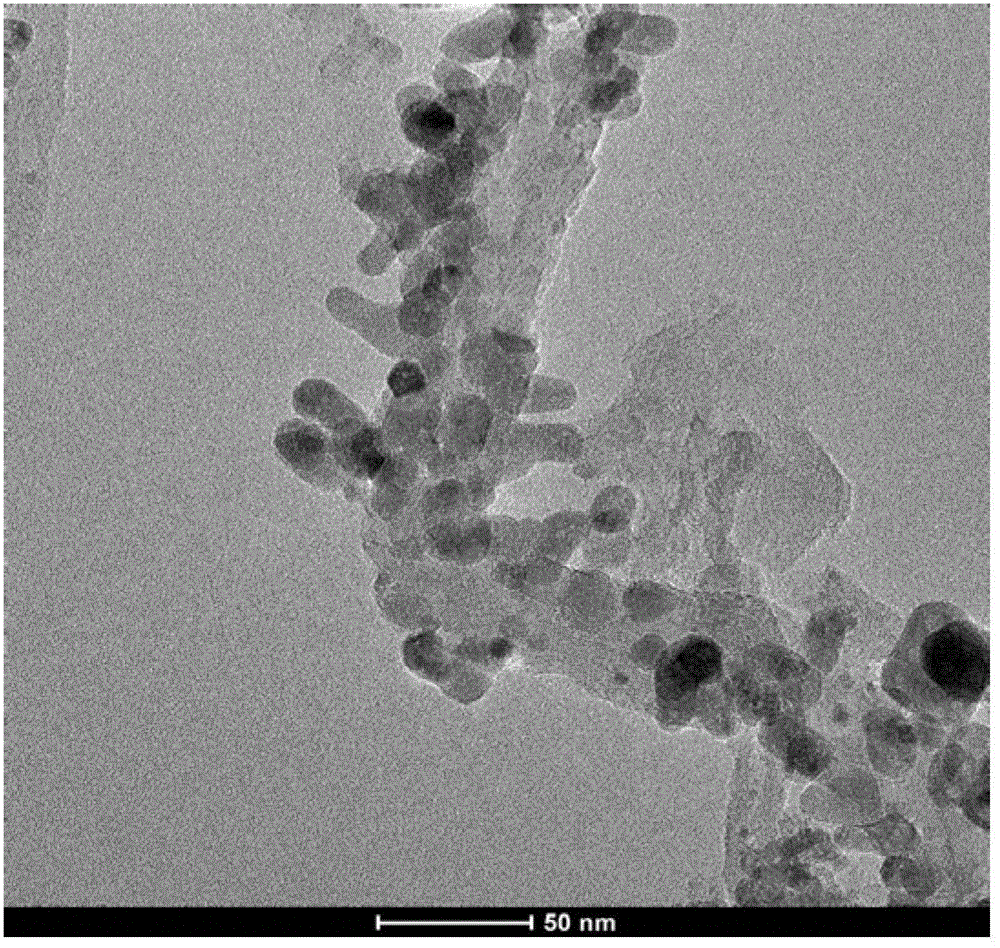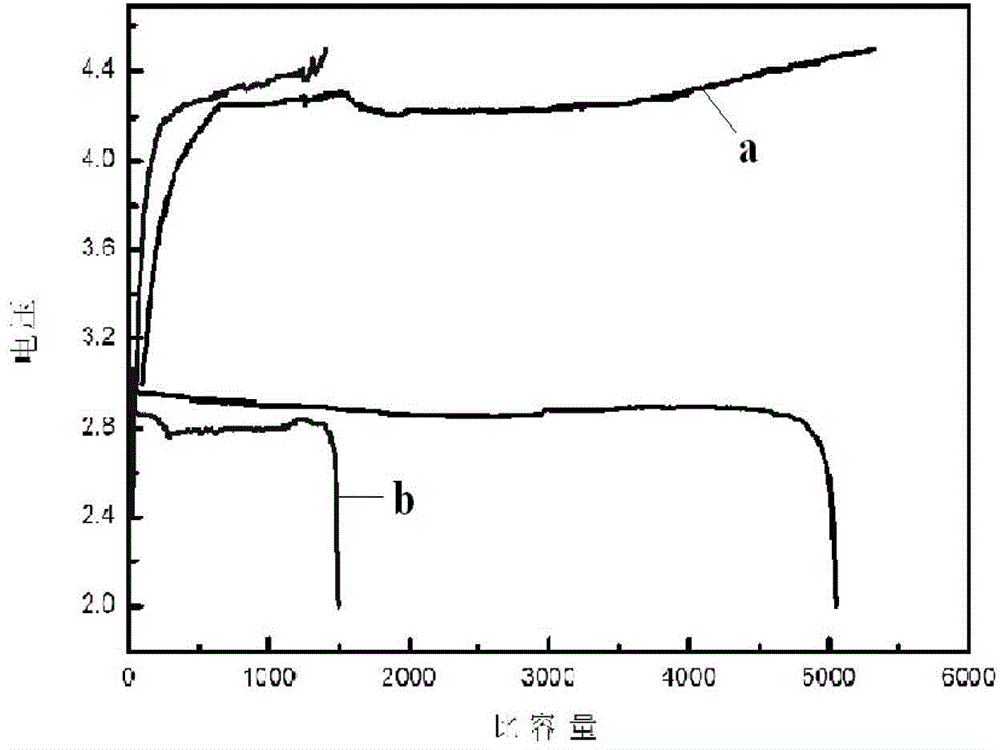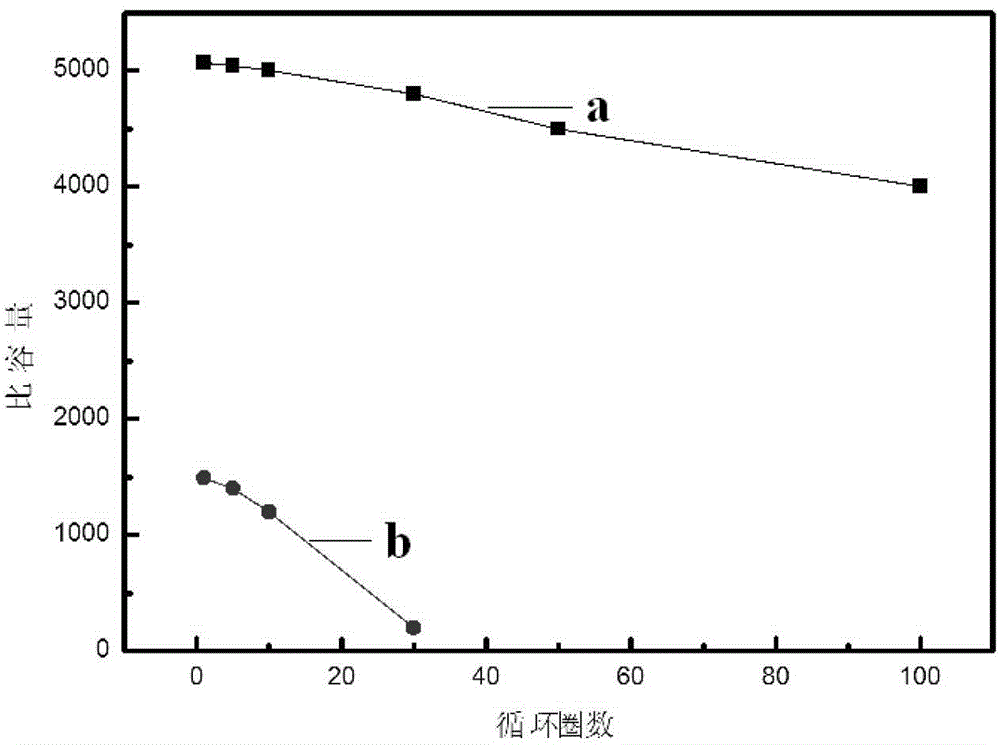Unsymmetrical lithia battery
A lithium-oxygen battery, asymmetric technology, applied to battery electrodes, circuits, electrical components, etc., can solve problems that have not been effectively solved, oxygen channel blockage, etc., achieve simple and feasible preparation process, smooth oxygen diffusion channel, high The effect of capacity
- Summary
- Abstract
- Description
- Claims
- Application Information
AI Technical Summary
Problems solved by technology
Method used
Image
Examples
Embodiment 1
[0037] Weigh 1g lithium peroxide and 1g tricobalt tetroxide, put them into a ball mill for vacuum ball milling for 10 hours, and then add the 2 Continue vacuum ball milling for 10 hours with 4g of carbon nanotubes / g, the ball milling speed is 500r / min, and the ball-to-material ratio is 50:1. Weigh 0.4g of mixed powder, mix conductive carbon and binder at a weight ratio of 80:10:10 to make a positive electrode, and punch the pole piece into an electrode piece with a diameter of 10 mm, use graphite as the negative electrode, and the electrolyte is 1M LiTFSI / TEGDME , assembled into a CR2025 button cell in an argon-filled glove box. Such as figure 1 As shown, after the two-stage ball milling, the lithium peroxide and the catalyst were uniformly distributed on the surface of the carbon nanotubes.
Embodiment 2
[0039] Weigh 1g of lithium peroxide and 2g of manganese dioxide, put them into a ball mill for vacuum ball milling for 10 hours, and then add 2 4g of activated carbon per gram continued vacuum ball milling for 10 hours, the ball milling speed was 500r / min, and the ball-to-material ratio was 50:1. Weigh 0.4g of mixed powder, mix conductive carbon and binder at 80:10:10 to make a positive electrode, and punch the electrode sheet into an electrode sheet with a diameter of 10 mm, use graphite as the negative electrode, and the electrolyte is 1M LiTFSI / TEGDME. A CR2025 button cell was assembled in an argon-filled glove box. Such as figure 2 As shown, the initial charge and discharge capacity of the asymmetric lithium-oxygen battery reaches 5065mAh / g, which is greatly improved compared with the 1490mAh / g of the traditional lithium-oxygen battery. At the same time, if image 3 As shown, the cycle performance of the battery is significantly improved. The specific cycle retention ...
Embodiment 3
[0043] Weigh 1g of lithium peroxide and 1g of manganese dioxide, put them into a ball mill for vacuum ball milling for 10 hours, and then add 2 4g of activated carbon per gram continued vacuum ball milling for 10 hours, the ball milling speed was 500r / min, and the ball-to-material ratio was 50:1. Weigh 0.4g of the mixed powder and mix it with conductive carbon and binder at a weight ratio of 80:10:10 to make a positive electrode. The pole piece is punched into an electrode piece with a diameter of 10 mm. Lithium titanate is used as the negative electrode, and the electrolyte is 1M LiTFSI / TEGDME, assembled into CR2025 coin cells in an argon-filled glove box. After the negative electrode is changed to lithium titanate, because the lithium titanate deintercalation potential is different from that of graphite, the charging and discharging platform of the battery is changed.
PUM
| Property | Measurement | Unit |
|---|---|---|
| diameter | aaaaa | aaaaa |
Abstract
Description
Claims
Application Information
 Login to View More
Login to View More - R&D
- Intellectual Property
- Life Sciences
- Materials
- Tech Scout
- Unparalleled Data Quality
- Higher Quality Content
- 60% Fewer Hallucinations
Browse by: Latest US Patents, China's latest patents, Technical Efficacy Thesaurus, Application Domain, Technology Topic, Popular Technical Reports.
© 2025 PatSnap. All rights reserved.Legal|Privacy policy|Modern Slavery Act Transparency Statement|Sitemap|About US| Contact US: help@patsnap.com



